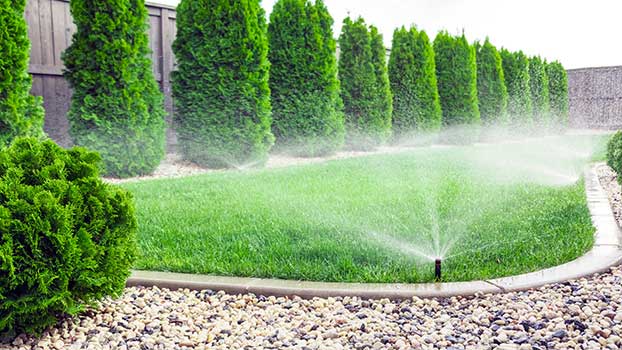Denver and Colorado as a whole is known for its beautiful landscapes and outdoor spaces, but experiences scorching summer temperatures that can be challenging for maintaining healthy gardens and lawns.
Protecting your landscaping during extreme summer heat requires strategic planning and proactive measures.
Here are key strategies to ensure your plants thrive even in the hottest conditions.

1. Water Wisely
Watering is crucial during the summer heat, but it’s important to do it efficiently to conserve water and ensure your plants get the moisture they need.
- Early Morning or Late Evening: Water your plants during the early morning or late evening when temperatures are cooler. This reduces evaporation and allows water to penetrate deeply into the soil.
- Deep Watering: Focus on deep watering rather than frequent shallow watering. This encourages roots to grow deeper, making plants more resilient to heat stress.
- Drip Irrigation and Soaker Hoses: These methods deliver water directly to the root zone, minimizing evaporation and ensuring efficient use of water.
2. Mulching
Mulching is one of the most effective ways to protect your landscaping from extreme heat.
- Regulates Soil Temperature: A thick layer of mulch (2-4 inches) helps keep the soil temperature stable by insulating it from the heat.
- Retains Moisture: Mulch reduces evaporation, helping soil retain moisture longer.
- Prevents Weed Growth: Mulch also suppresses weeds that compete with your plants for water and nutrients.
3. Shade Protection
Providing shade can significantly reduce heat stress on your plants.
- Shade Cloths: Install shade cloths over delicate plants to shield them from direct sunlight during the hottest part of the day.
- Strategic Planting: Plant taller plants or trees to provide natural shade for smaller, more vulnerable plants.
- Temporary Structures: Use temporary structures like pergolas or umbrellas to protect plants during extreme heat waves.
4. Soil Management
Healthy soil is essential for plant resilience.
- Organic Matter: Incorporate organic matter such as compost into your soil. It improves soil structure, water retention, and nutrient availability.
- Soil Testing: Regular soil testing helps you understand your soil’s nutrient levels and pH balance, allowing you to make necessary adjustments.
5. Plant Selection
Choose plants that are well-suited to Denver’s climate.
- Drought-Tolerant Plants: Opt for native and drought-tolerant plants that can withstand high temperatures and require less water.
- Heat-Resistant Varieties: Select plant varieties specifically bred for heat resistance.
6. Regular Maintenance
Consistent care is key to keeping your landscaping healthy.
- Pruning: Remove dead or damaged plant material to improve air circulation and reduce stress on plants.
- Fertilizing: Use a balanced fertilizer to provide essential nutrients, but avoid over-fertilizing, which can stress plants.
Putting it All Together to Preserve your Landscape
Protecting your landscaping during Denver’s extreme summer heat involves a combination of smart watering practices, mulching, shade protection, soil management, and choosing the right plants. By taking these proactive steps, you can ensure your garden remains vibrant and resilient, even in the hottest conditions. Proper care and planning not only enhance the beauty of your outdoor space but also contribute to sustainable water use and overall plant health.
If you’re looking for some experienced help in the Denver area, please reach out and contact us. OnePro has been enhancing and guarding landscapes around Colorado, they have a lot of experience to protect yours too!
